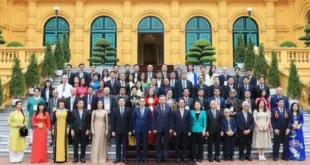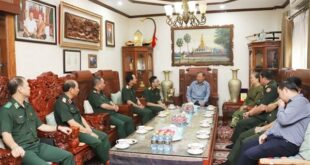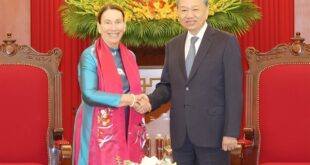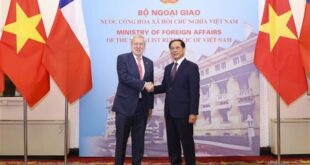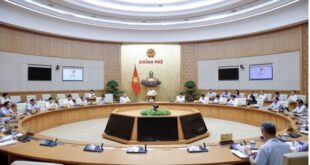.jpg)
|
| Secretary of the Communist Party of Việt Nam (CPV) Central Committee and head of its Commission for External Relations Lê Hoài Trung. VNA/VNS Photo |
HÀ NỘI – Secretary of the Communist Party of Việt Nam (CPV) Central Committee and head of its Commission for External Relations Lê Hoài Trung unveiled the successful outcomes of the state visit to China by Party General Secretary and President Tô Lâm from August 18-20, in a press briefing in Hà Nội on Tuesday.
Trung said the meticulous and respectful reception accorded to General Secretary and President Tô Lâm by the Chinese Party and State underscores the importance China places on its relationship with Việt Nam.
The visit, Lam’s first foreign trip since his election as General Secretary of the 13th CPV Central Committee, included 18 key activities, such as talks with Chinese Party General Secretary and President Xi Jinping, witnessing the signing of cooperation agreements, attending a tea party and state banquet hosted by Xi, and meeting with other key Chinese leaders and officials.
His spouse Ngô Phương Ly also met with the spouse of General Secretary and President Xi, Prof. Peng Liyuan, contributing to raising mutual understanding and friendly relations between the two countries and their people.
The Party official said during the visit, General Secretary and President Tô Lâm affirmed the Vietnamese Party and State’s policy of valuing and giving top priority to its relationship with China, a sentiment echoed by Xi and other key Chinese leaders who also confirmed Việt Nam’s importance in China’s neighbourhood diplomacy.
Both sides agreed to continue high-level strategic dialogues and strengthen relations between leaders of the two Parties and countries.
Trung highlighted that the two sides agreed to enhance cooperation in strategic areas such as diplomacy, national defence, and public security. They also committed to expanding connectivity between the “Belt and Road Initiative” and the “Two Corridors, One Belt” framework, accelerating “hard connectivity” in infrastructure, border crossings, and cross-border railways, and fostering “soft connectivity” in smart customs.
China pledged non-refundable aid for Việt Nam to plan and conduct feasibility studies for railway lines connecting with China. Both sides also agreed to explore pilot projects for smart border crossings, establish economic cooperation zones along the border, and develop secure and stable production and supply chains. Additionally, they support the involvement of capable Chinese enterprises in economic development in Việt Nam.
Apart from the joint statement, 16 practical cooperation agreements were signed, covering various fields such as theoretical and training cooperation between the two Parties, transportation, banking, education, healthcare, trade, and protocols on the export of Vietnamese agricultural products, as well as media communications.
According to Trung, a highlight of the visit was a tour of Guangzhou in Guangdong province marking the 100th anniversary of President Hồ Chí Minh’s arrival in Guangzhou as an international advisor to the Communist International. This provided an opportunity for both sides to reminisce about the traditional friendship, solidarity, and mutual support between the two Parties, countries, and their people, laying a stronger social foundation for the bilateral relationship.
Looking ahead to 2025 when the two countries celebrate the 75th anniversary of diplomatic ties, the leaders decided to designate 2025 as the “Year of Việt Nam-China Humanistic Exchange” to raise public awareness of the traditional bilateral friendship.
To build upon the achievements of the visit, Trung urged departments, agencies and localities to fully understand and grasp the importance of Việt Nam-China relations within the broader framework of the foreign policy of independence, self-reliance, multilateralisation and diversification of external relations.
He suggested building specific plans and roadmaps to effectively realise high-level common perceptions and regularly inspect the implementation. – VNS
- Reduce Hair Loss with PURA D’OR Gold Label Shampoo
- Castor Oil Has Made a “Huge” Difference With Hair and Brow Growth
- Excessive hair loss in men: Signs of illness that cannot be subjective
- Dịch Vụ SEO Website ở Los Angeles, CA: đưa trang web doanh nghiệp bạn lên top Google
- Nails Salon Sierra Madre
 VnExpress News The News Gateway of Vietnam
VnExpress News The News Gateway of Vietnam
